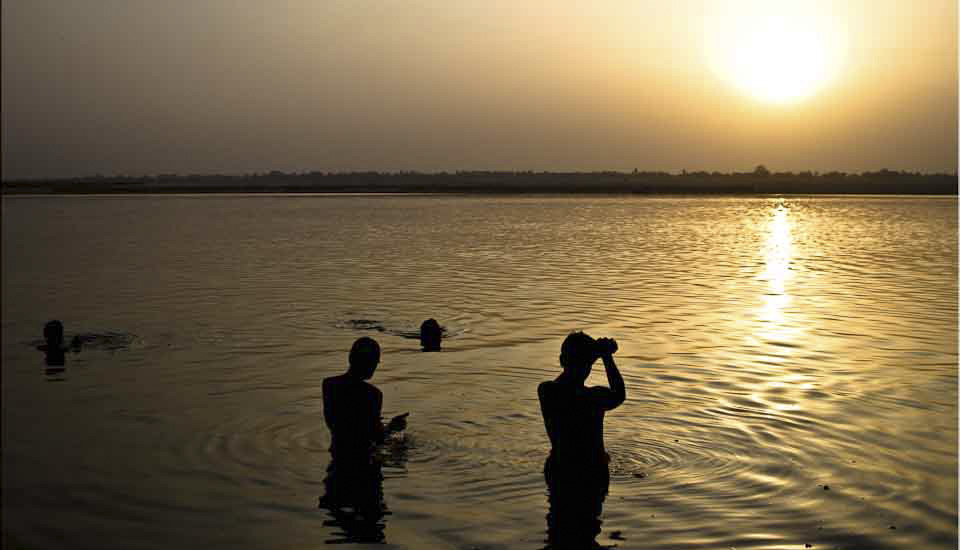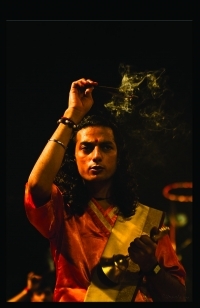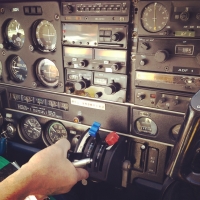.jpg)
Feathers, Shells, and Face Paint
These Western Highland women have spent hours getting ready – but now they can sing, dance, and enjoy themselves – which is what the Mount Hagen Cultural Show is all about.
Papua New Guinea is known for its colourful tribes. Even the official government tourism site features different tribal groups in their elaborate tradition costumes and face paint.
Of course, the country is also known for its ongoing inter-tribal animosities. Tribal warfare continues to be the subject of regular news reports and academic study.
Papua New Guinea sing sings are gatherings of tribes or villages to show off their distinct culture, dance, and music. The Mount Hagen sing sing started back in the early 1960s, before Independence, as a peacekeeping effort to foster understanding between sparring tribes. The colonial administrators hoped to reduce tribal fighting by promoting positive forms of competition.
Today, this popular event takes place every year on the Saturday and Sunday of the third weekend of August at the Kagamuga Showground in Mount Hagen. Cash prizes and significant prestige are still available to the ‘winners’ in terms of dance, performance, and traditional costume. The festival attracts up to 100 distinctive cultural groups from the Western Highlands Province, and from all over the rest of the country, and is a popular stop on tourist itineraries. As well as bringing in tourist dollars, this festival – and others like it – help to keep indigenous languages and culture alive by valuing the external expressions of these timeless traditions, and encouraging participation by younger community members.
Some years ago, I was at the Mount Hagen Sing Sing Festival with photographer Karl Grobl from Jim Cline Photo Tours and a small group of photography enthusiasts. We spent significant time watching and photographing while the disparate groups they got ready for their performances. The array of distinctive tribal costumes, face-paints, and headdresses was just amazing (see: Mount Hagen)!
The main show runs from about 9am to 2pm, and it was now the last day; I spent the morning in the nearby school where a number of Western Highland troupes were putting the final touches on their outfits and paint (see: Portraits on a Rainy Morning).
When I returned to the main show grounds, it was just in time for the last dances – and a few more colourful portraits.
Join me!
.jpg)
Women’s Practice Session
In a corner of the school yard near the Mount Hagen Sing Sing Festival Showgrounds, a Western Highlands women’s group put in a last-minute practice.
.jpg)
Feathers, Fur, and Shells
The women’s heavy and elaborate neck scarves are made from colourful cuscus fur interlaced with different types of shells.

Tall against the Sky
The women stand proud in the face paint, tall feathered headdresses, heavy shell necklaces and and kina-shell breast plates.

Local Forces
A short walk away in a large paddock, a number of tribal groups are getting ready. The police presence is conspicuous and well armed …

Police Special Services Division
… but friendly.

Yellow and Black
A bilum is an iconic Papua New Guinean string bag made using a knotless netting technique. The same skill goes into making the colourful hats that are stuffed with moss (or other materials) and often decorated with beads, leaves, and feathers.

Concentration
Everyone is concentrating on their small, hand-held mirrors. I love the bikini-clad young lady pictured on this one.

Tribal Shields
On the way into the show grounds, a number of local items are on display and for sale: carvings; paintings; bilum bags; woven sisal, seagrass, and cane products; and leather goods.

Moikep Bamboo Flute Group
Inside the show grounds, colour and sound is everywhere – …

Moikep Man on a Bamboo Flute
… but not every group is here to dance, and not every performer is in costume.

Western Highland Women Dancing
After they have done a few laps around the exhibition space, the different groups continue dancing in their own little corners – …

Red White and Blue
… – somehow managing to ignore competing songs and rhythms just a few feet away.

Tuckered Out
Not everyone can last the distance!

Same, Same, but Different!
I thought this was the same group I had watched practicing at the school – but they are not! There are small, but significant differences in their headdresses and face paint. And of course, the songs and dances are different.

Mindima Woman
In a similar fashion, these headdresses resemble those from Jiwaka, the next province to the west. But, the women’s hand-written cardboard sign identified them as the Mindima Women’s Group, which is from nearby Chimbu (Simbu) Province.

Last Song : Last Dance

Huge Headdress
The Chimbu are known for their huge headdresses made from bird of paradise feathers which can be up to one meter long.

Feathers
I’m always staggered by the number of rare parrots and other bird parts that make it into these fantastic ceremonial headdresses. Fortunately, they are usually well looked after between festivals, so new headdresses are not needed every year.

Kerapia Boys Hela Wigman
As I’ve spoken about before, the Wigmen from Hela Province grow their own hair to make their elaborate headdresses. The young woman’s hat, on the other hand, is constructed from fur and feathers.

Western Highlands Boy

Western Highlands Man
Some of the men’s headdresses stand incredibly tall – and it’s hard to get the whole thing into one shot as they loom against the sky. Fortunately, the festival has wrapped up – as it looks like it is going to rain again!
It certainly is – as advertised – a cultural festival for the senses! The kaleidoscope of colours and noise stayed with me for a long time after the last dance was finished.
 I think we were all winners.
I think we were all winners.
Until next time,
Keep Smiling!
Pictures: 20August2017

























.jpg)

